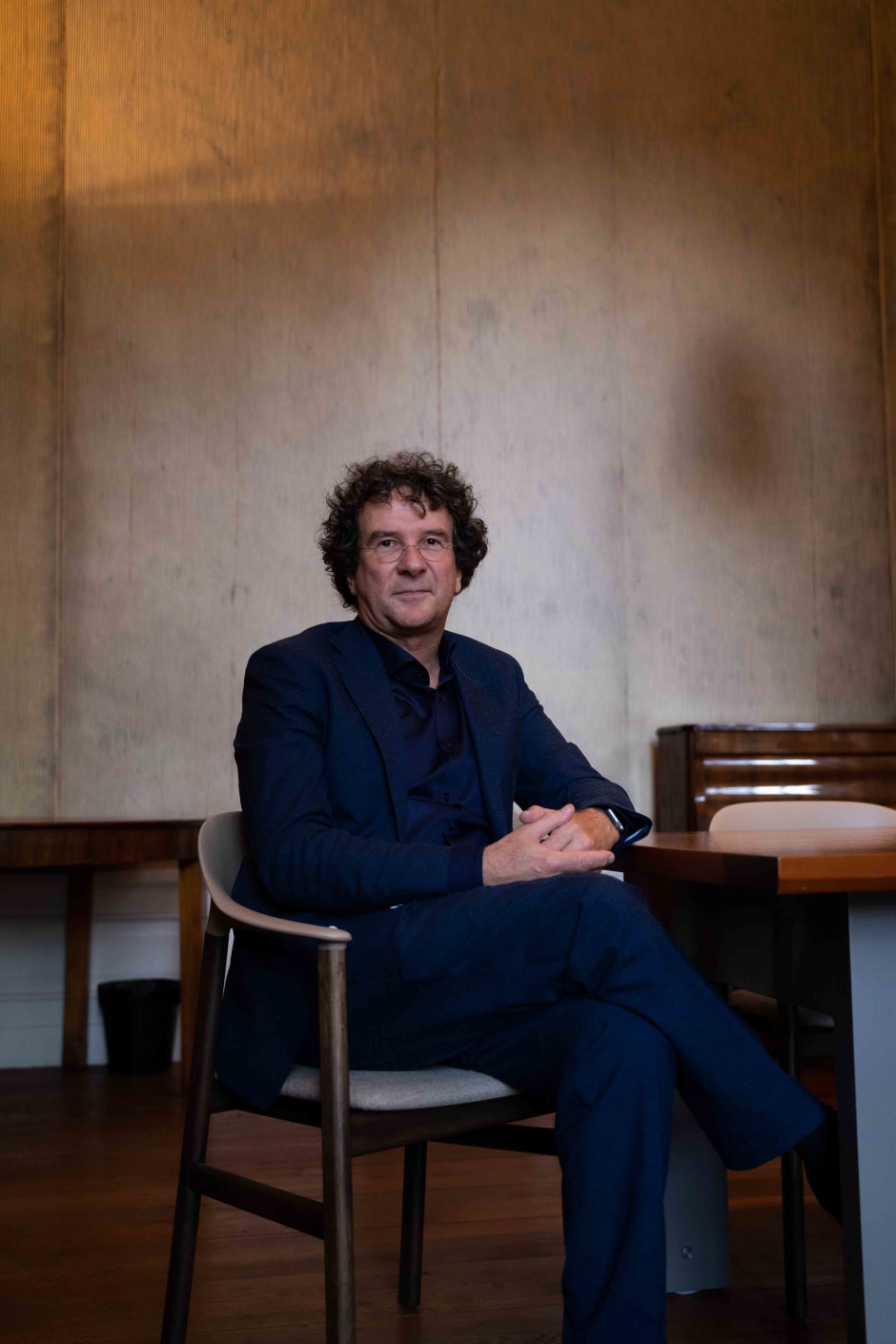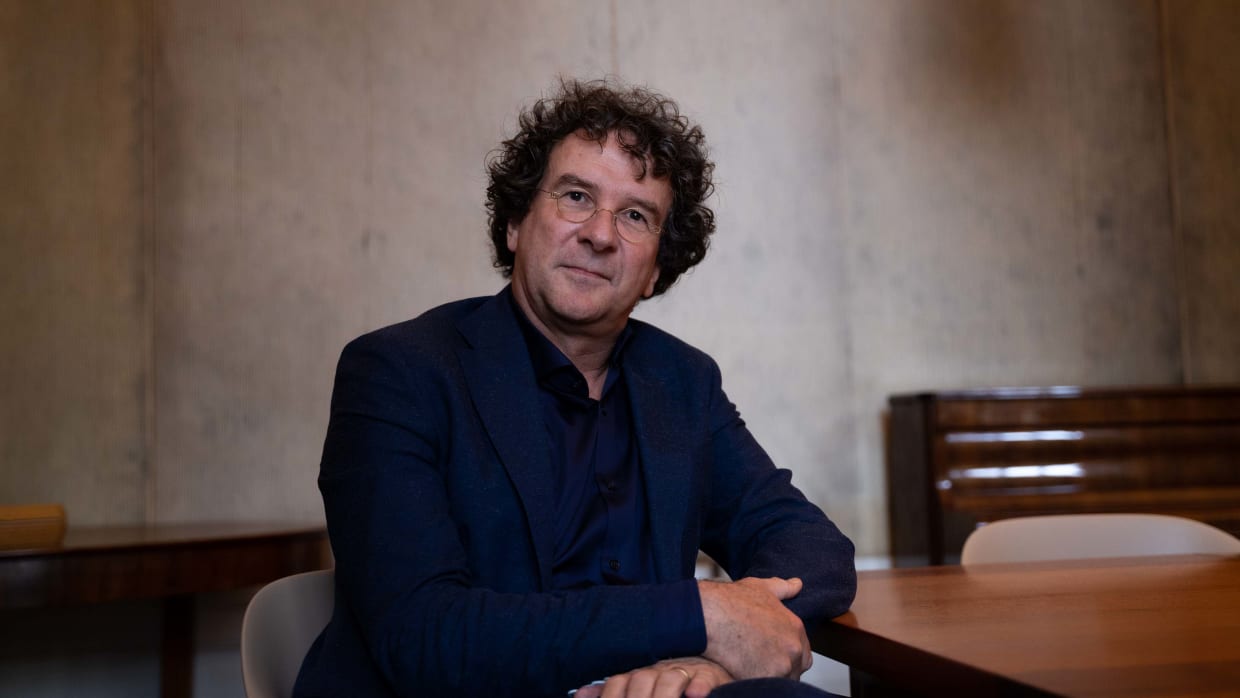
Peter-Paul Verbeek: ‘Not genocide, but genocidal violence’
On second thought, rector magnificus and deputy chair of the Executive Board Peter-Paul Verbeek has decided not to use the word “genocide”. An interview about his dilemmas and his conversations with the protesters this week. “It would be very presumptuous of me to think that I could determine from my office as rector that genocide is taking place.”
Last week, you decided to publish a letter in which you spoke of “genocidal violence”. What prompted this decision?
“I had been thinking for a long time about when it is appropriate for a university administrator to speak out. It is a kind of struggle that, in your role as rector, you also have a responsibility to maintain space for open scientific exchange and open dialogue. For that reason, we have always been very cautious. At the same time, you see that the scientific consensus that there is genocidal violence in Gaza has grown to such an extent that at a certain point you start to wonder how much space is still needed.”
“The NIOD recently produced an analysis, as a kind of conclusion, based on the many studies that have been carried out. And that was a moment when I thought to myself, you also have to take responsibility as a scientist. You can no longer deny that something like global warming exists.”

This week, Folia quoted a spokesperson for the University of Amsterdam who spoke about genocide. The Executive Board, or perhaps you yourself, were not happy about this afterwards.
“That was an accident. I wanted to use the term ‘genocidal violence’ carefully, as I had done in my letter, and not the word ‘genocide’.”
What is the difference?
“Yes, now I'm venturing into a field that is not mine.”
But the discussion arose about the fact that the word “genocide” was used and not the term “genocidal violence”. So apparently the difference is important after all.
“I think the distinction is that if you say that genocide has taken place, you must have established beyond any doubt that an entire people is being deliberately exterminated. A term such as genocidal violence indicates that the violence is so intense that it leads to so many victims that an entire population group is the victim of...”
... genocide?
“Yes, that’s not quite how I would put it. I think what you are trying to say is that you are moving in the direction of genocide. But I don'’ feel comfortable with that. Genocidal violence means violence with characteristics or features of genocide, which is a very serious accusation. It is not yet a conclusion that genocide is actually taking place, but the violence is so severe that it is moving in that direction. That is an important distinction for me. In my role as rector, I want to base my statements on scientific sources, and because the NIOD, which is my guiding authority, also refers to “genocidal violence”, I would like to stick to that terminology.”
At the same time, UvA scientist Uğur Ümit Üngör from Holocaust & Genocide Studies in NRC also speaks of genocide. So if you say, I want to base my opinion on science, you could also do so using the knowledge available in-house.
“The NIOD bases its findings on multiple sources and facts, on multiple insights. I see that as a kind of synthesis of what is happening in the scientific field. That is why I feel most comfortable following their terminology. I do not want to deny the value of our own scientist, but science works in such a way that many people conduct research and come up with insights. It is precisely by linking these insights together that you make progress. And for me, the NIOD is now the place where this is done in the right way.”
You could also say that genocide is genocide because it happens, not because the NIOD or a court of law determines that it is.
“I find that a remarkable question. Because that would mean that I can determine with certainty that genocide is taking place. But I am based at Roeterseiland. It would be very presumptuous of me to think that I can determine that from my office as rector. So I have to rely on empirical research and the insights of people who have thought about this for a very long time.”
This week, agreements were made between the protesters and the Executive Board. One of the agreements is that an urgent letter will be sent from the UvA to the cabinet. Does that still make sense, now that the cabinet is outgoing?
“Perhaps let’s first discuss the word ‘agreement’. I am very keen to make it clear that the discussions with the people in the camp have been good, but that I cannot see them as negotiations. We will work on the six points we have discussed, but we will also take our decisions together with our representative bodies. This means that the commitments we make here will also go through the normal procedure with the representative bodies.”
“I think that letter is definitely worthwhile. It is an initiative of three deans, who started it around Ascension Day.”
Is it a letter sent on behalf of the UvA?
“No, it is an initiative from the deans. They will also seek support elsewhere in the country.”
Will you sign it?
“I haven’t seen the text yet. But once I have seen the final text and I agree with it, I will think about it carefully.”
Another agreement is that Tel Aviv University will now also be reviewed. Why was this not done earlier?
“The assessment framework is now final. We used it at the time for collaborations that were coming to an end, such as the one with Hebrew University. Now we also want to use the framework for ongoing collaborations, such as the one with Tel Aviv University. Apart from Hebrew University, this is the only university with which the UvA has an exchange agreement at board level, meaning that the Executive Board signs an agreement to allow a number of students to study at each other’s institutions each year. The new starting point for this framework is to assess external collaborations, for example with a country that is at war. If there is an increased risk of involvement in human rights violations, we also wanted to have the option of investigating existing collaborations.”
Ghent University severed all ties with Israeli academic institutions. So it is possible, you might say.
“They are trying, but they are not succeeding. Legally speaking, it is very difficult to withdraw from European projects. European law prohibits discrimination on the basis of nationality. I think the fact that Ghent University wants to do this is very meaningful for some people at the university there, but it is emphatically not the route we have chosen. And that is precisely the crux of the discussions with the people in the camp: they want a boycott. We want to keep the connection open and choose to assess collaborations through an ethical framework. That is a point on which we ultimately disagree. Unfortunately, the protesters have now sent a letter stating that they consider the discussions, which they refer to as negotiations, to have failed.”
Israeli anthropologist Maya Wind argues that Israeli institutions are complicit in the violation of Palestinian rights.
“You could say that every university has a connection with the army and therefore that university is no good. That's the boycott narrative, which is also what Maya Wind is saying. Our story is that, while we find it terrible that the university is involved in things it should not be involved in, we believe that open collaboration is of great value. The fact that we work in a country with a certain government does not mean that everyone approves of that government. There are people here at the university who do not approve of my policy, but who are still studying here. In the case of Hebrew University, our assessment is that the exchange programme increases the risk of students coming into contact with human rights violations, and that is unacceptable. However, new projects may be submitted to Hebrew University that are acceptable. It will then be up to the committee to reassess them. It’s not a very sexy story, but it’s a very nuanced one.”
What if faculties decide for themselves to sever ties, for example with Israeli institutions or in the field of research collaborations? Is that possible?
“As things stand, that is not a relevant question. We have carefully formulated the decisions together with the deans. So none of our deans are considering severing all ties. It’s actually the opposite: all our deans value scientific collaboration highly, but they are also very concerned about the situation in Gaza and certainly don’t want to contribute to it unintentionally through collaboration. In any case, almost no projects are submitted that are subject to doubt, and even then they must first be assessed by an advisory committee.”
“Moreover, and this is also very important to note, European cooperation projects are, by law, the mandate of the deans. So the Executive Board does not even have a say in the matter.”
But those cooperation agreements do bear the signature of the UvA.
“In order to conclude the contract and ensure that funds flow from the European Commission to the UvA, a signature from the board is indeed required. Technically speaking, we could therefore frustrate these collaborations, but I wonder whether this is legally tenable.”
Nevertheless, I understood that board members do not always see eye to eye on certain issues.
“I did tell the protesters, and I don’t normally reveal such things, that we had had some heated discussions about how to respond to their demands. That was not about whether we should boycott or not. I wanted to mention it to show that it is a complex issue for everyone and that talking helps you get ahead.”
Finally, how long can the protesters stay? The summer holidays are still quite a long way off.
“Due to a ruling by the Public Prosecution Service, we have to consider the ground where the tents are pitched as public land. So there is no question of trespassing. And I have to say, I think it's going very well, including the discussions. I found it difficult at times last year; as an individual, you can feel intimidated. There are no barricades, people are not wearing face coverings and I am spoken to in a friendly manner. I greatly appreciated the discussions and I am genuinely sorry to have received an email informing me that the discussions have now been terminated.”



